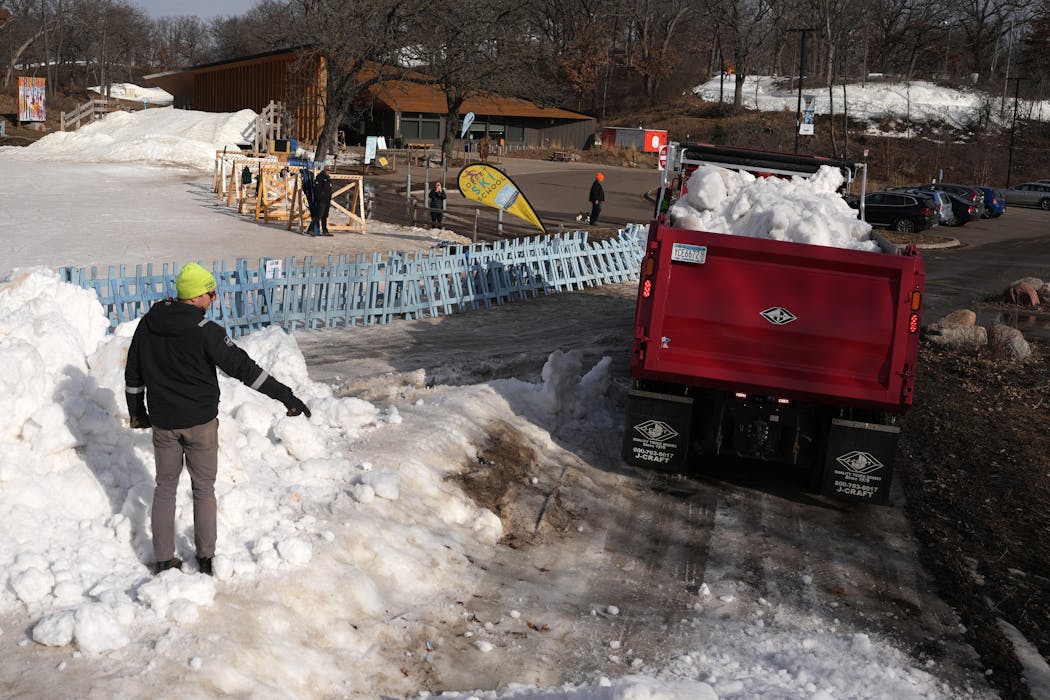Minnesotan Jessie Diggins will race for Team USA in her home state for the first time.
It's a long-awaited return to the United States for the World Cup of cross-country skiing, which was last held as an event in the United States 20 years ago. But it comes in the middle of a Minnesota winter that's set records for its mild temperatures.
Artificial snowmakers and dump trucks allowed the International Ski and Snowboard Federation to soldier on with its World Cup competition. The two-day event is scheduled to take place at Theodore Wirth Park on Feb. 17 and 18.
It's the first time in two decades such a large skiing competition has been held stateside.
"We made 7 kilometers' worth of ski trail that's about 2 feet deep, so we made a significant amount of snow in a short period of time," said Claire Wilson, executive director of the Loppet Foundation.
More than 150 athletes from 21 countries will compete in front of a sold-out crowd, with limited VIP tickets still available.
Much of the artificial snow is already out on the track and Wilson said her team is confident about making more as temperatures are expected to drop into the 30s this weekend.
Skiers are accustomed to both freezing temperatures and 50-degree weather and prepared for whatever conditions take place on race day. Kristen Bourne and other Team USA coaches splash skiers with water when the weather is warm and make race suit adjustments to combat the heat.
"Athletes are great at adapting to the different weather conditions, so it doesn't necessarily affect the effort they put out on the trail," Bourne said.
Snow conditions affect the type of equipment athletes use. Bourne said ski selection is "imperative" for an athlete's performance on the track.
"Race results are generally very tight, and quite a bit of time can be lost if the ski doesn't fit the snow conditions," Bourne said.
World Cup athletes typically have around 40 different pairs of skis to choose from.
Athletes will work with their coaching staff to test the skis until the moments leading up to the race before they make their final selection.
"It's a very orchestrated (process)," said Chris Harvey, head coach for Loppet Nordic Racing.
The Loppet Cup will be the first time Diggins, a three-time Olympic medalist, races in her home state. Her 300th World Cup is happening this weekend at the Alberta World Cup in Canmore, Canada. In Minneapolis, she'll get the opportunity to race in the place where it all started.
The Minnesota skier defaulted to her family's VHS tapes to watch professional skiing.
"Some of those tapes were three years old, but I would still watch them with my family because that was the only way to watch World Cups," Diggins said.
Diggins is excited to race in front of the same people who supported her skiing career. The event will give children the chance to see the world's best skiers live and help bring the sport to a different audience.
Athletes train full-time 11 months out of the year with one month being minimal training, but still doing some training in the off-season. The athletes' personal schedules revolve around their training, so it requires significant dedication to the 24/7 lifestyle.
"I think this World Cup is going to help legitimize the sport in the States because we're always trying to grow it, and I think this will be a big boost for us," Diggins said.

Want to share info with the Star Tribune? How to do it securely

'Safe recovery sites' would offer syringes, naloxone and more to people using drugs. The plan could be in peril.
New Minnesota GOP leaders seek peace with party's anti-establishment wing

Who is Republican Lisa Demuth, Minnesota's first House speaker of color?


